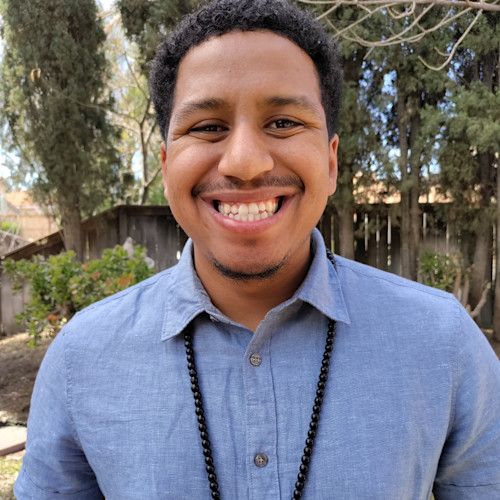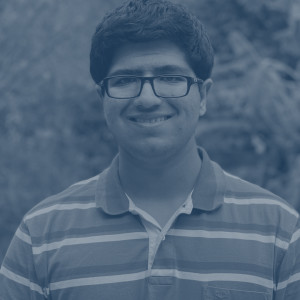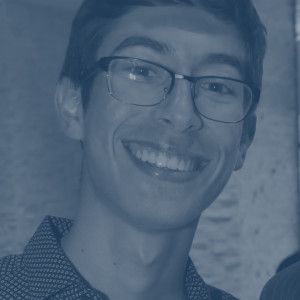Jarrel Thomas, 28

Jarrel was a tinkerer and enjoyed taking things apart when he was growing up. In middle school, Jarrel’s best friend was interested in radio technology, and when they hung out, his friend would talk about tearing apart the technology he found on the street. Jarrel found himself getting interested as well, and they would spend their afternoons taking apart radios and boomboxes. Near the end of middle school, they expanded this interest into exploring other hardware and software, taking apart old PlayStations and Xboxes, digging into the hardware and firmware to figure out how it worked, and getting very mad when they accidentally broke stuff. Jarrel’s biological dad was a car mechanic and good with electronics, so Jarrel continued these interests later in life by gaining some experience building custom speaker systems and working on cars.
Jarrel is mostly self-taught in his tech interests, and while his middle school did not have computer science classes, he took classes in game design to scratch his tech itch and joined the aviation club because it involved programming controllers and microchips on RC planes. In high school, he took computer business and computer system classes, but they were more oriented around business than tech, so he used YouTube to learn about coding and different forms of coding. When his mom saw him taking interest in technology in high school, she suggested that he try to be a mechanic like his biological dad because it made good money. Much of Jarrel's family were lower-class blue-collar workers, so they only knew how tech applied to mechanics, not about the world of opportunity for Jarrel’s talents in computers. Jarrel ended up deciding to give mechanics a shot by attending a technical school.
Jarrel found Facebook groups and local groups for him to ask questions and gain resources from fellow developers. The local meet-up community skyrocketed him full force towards coding during his freshman year at technical school, as someone on Facebook told him about a nearby coding group, Riverside Hackerspace IO. The group worked on a variety of coding projects, introducing and tackling new ideas each month. They would decide on the project, meet over lunch or dinner to discuss and work together, and then collaboratively finish the rest of the project on GitHub over the following month.
A member of the coding group offhandedly mentioned MLH and an event at UCR called Local Hack Day to Jarrel, and not knowing anything about MLH, he decided to google it. He found MLH really cool and watching YouTube videos about their work at various schools inspired him to attend Local Hack Day. The event wasn’t as big as in the videos he saw, but being introduced to the work that MLH does and the hackathon environment got him hooked, and he could never get enough of hackathons since. He did not make a project at the event but was so amazed by the larger community that he spent the weekend attending workshops and soaking the experience in. He describes MLH as a gem that he is grateful for finding early on, and now when he sees anyone remotely interested in computers, he sends them towards MLH. Jarrel went on to attend Citrus Hack at UTR before branching out to other local in-person hackathons. He even traveled from California to Florida for an event and attended a number of virtual hackathons in 2020.
By the time he graduated from technical school, Jarrel realized that he had a good grasp of technical concepts but wasn’t as good at applying them to mechanical work. He soon got a job at a local shop, and while a mentor trained him to refine his mechanical work, Jarrel helped the mentor with his computer, as he was attending hackathons at this time and developing computer skills as a hobby. The boss of the shop eventually asked Jarrel why he was working in the shop if he was already so good with computers, and a light bulb went off in his head.
After talking to his then-girlfriend (now wife) about pursuing computer science, and consulting the Riverside Hackerspace for information, Jarrel realized that there are a ton of jobs for the things he was already doing on computers. Jarrel had never thought that his hobby could become his job, yet he forged a path to make that dream a reality. The hacker community helped Jarrel realize that he had the skills and potential to work with people that he had looked up to and that a career in computer technology was much closer than he had ever imagined. He attended Florida Tech to study Computer Science, graduated in February 2020, and secured a job in system administration afterwards. Jarrel worked in Windows and made custom bash scripts to configure the city of Redland’s computer systems, as well as provided general IT technician support as needed. At the time, he was doing more business work than tech work but hoped to move towards web management and using HTML and CSS in the future.
Despite being technologically savvy and fascinated by computers, Jarrel perceived the barrier for entry into the tech field to be higher than it actually was. It was only once he joined the hacker community that he realized how many applicable skills he already had and how attainable a career in computing would be. Hackathons helped Jarrel not only acquire professional skills, but also explore different fields of technology to find what he is passionate and proficient in, and just how they helped him explore and narrow down his career path choices, others too can forge their own way by exploring and learning at hackathons. Jarrel now works for Twilio as a support engineer and continues to encourage new hackers and the uninitiated to get into tech and begin their journey tackling causes they wish to help support or create solutions for. By showing them where to start and feeding their tech passion through solving an important issue, Jarrel helps many hackers become less intimidated by misperceptions about barriers of entry in the tech field, and helps them get their feet wet in the hacker community and start programming.
One of Jarrel's favorite projects he created was at the virtual event Hack20, not only because of the project itself but also because of his first experience in a team environment. Jarrel typically worked solo or with one other partner at hackathons, but for Hack20 he threw out a line on discord to see if anyone wanted to make a team. Other students from Virginia Tech started messaging him, and he ended up on a five-person team. They began by creating a project aimed at helping community members contact the police, but during a time of controversy and tension around police interactions with minorities, they felt that the project didn’t make much sense. They decided to pivot and instead make a tool for police departments to try and improve such fraught relations. The project turned into POBS, a Police Officer Bias Simulator, which uses augmented reality to create a scenario simulator for training. Police would use the app on their phone and find themselves in a real-time geographically-simulated scenario where they must use their instincts to respond to the situation, and afterward receive a debrief with the impacts of their decision and action on the involved parties. The project ended up winning the Chef software prize, and Jarrel found the team dynamic exhilarating and a great learning experience that makes him want to work more with larger groups in the future.
Jarrel sees himself as an underdog in the hacker community who will never give up, coming from an underprivileged background to pursue his natural talents and passions in a field where he is an underrepresented minority. He may never be the next Linus Torvald or Bill Gates, but he will always be the one that stays up late at night learning as much as possible so that he can stay in the same room as the greats.
Quick Facts
Jarrel Thomas, 28

Jarrel was a tinkerer and enjoyed taking things apart when he was growing up. In middle school, Jarrel’s best friend was interested in radio technology, and when they hung out, his friend would talk about tearing apart the technology he found on the street. Jarrel found himself getting interested as well, and they would spend their afternoons taking apart radios and boomboxes. Near the end of middle school, they expanded this interest into exploring other hardware and software, taking apart old PlayStations and Xboxes, digging into the hardware and firmware to figure out how it worked, and getting very mad when they accidentally broke stuff. Jarrel’s biological dad was a car mechanic and good with electronics, so Jarrel continued these interests later in life by gaining some experience building custom speaker systems and working on cars.
Jarrel is mostly self-taught in his tech interests, and while his middle school did not have computer science classes, he took classes in game design to scratch his tech itch and joined the aviation club because it involved programming controllers and microchips on RC planes. In high school, he took computer business and computer system classes, but they were more oriented around business than tech, so he used YouTube to learn about coding and different forms of coding. When his mom saw him taking interest in technology in high school, she suggested that he try to be a mechanic like his biological dad because it made good money. Much of Jarrel's family were lower-class blue-collar workers, so they only knew how tech applied to mechanics, not about the world of opportunity for Jarrel’s talents in computers. Jarrel ended up deciding to give mechanics a shot by attending a technical school.
Jarrel found Facebook groups and local groups for him to ask questions and gain resources from fellow developers. The local meet-up community skyrocketed him full force towards coding during his freshman year at technical school, as someone on Facebook told him about a nearby coding group, Riverside Hackerspace IO. The group worked on a variety of coding projects, introducing and tackling new ideas each month. They would decide on the project, meet over lunch or dinner to discuss and work together, and then collaboratively finish the rest of the project on GitHub over the following month.
A member of the coding group offhandedly mentioned MLH and an event at UCR called Local Hack Day to Jarrel, and not knowing anything about MLH, he decided to google it. He found MLH really cool and watching YouTube videos about their work at various schools inspired him to attend Local Hack Day. The event wasn’t as big as in the videos he saw, but being introduced to the work that MLH does and the hackathon environment got him hooked, and he could never get enough of hackathons since. He did not make a project at the event but was so amazed by the larger community that he spent the weekend attending workshops and soaking the experience in. He describes MLH as a gem that he is grateful for finding early on, and now when he sees anyone remotely interested in computers, he sends them towards MLH. Jarrel went on to attend Citrus Hack at UTR before branching out to other local in-person hackathons. He even traveled from California to Florida for an event and attended a number of virtual hackathons in 2020.
By the time he graduated from technical school, Jarrel realized that he had a good grasp of technical concepts but wasn’t as good at applying them to mechanical work. He soon got a job at a local shop, and while a mentor trained him to refine his mechanical work, Jarrel helped the mentor with his computer, as he was attending hackathons at this time and developing computer skills as a hobby. The boss of the shop eventually asked Jarrel why he was working in the shop if he was already so good with computers, and a light bulb went off in his head.
After talking to his then-girlfriend (now wife) about pursuing computer science, and consulting the Riverside Hackerspace for information, Jarrel realized that there are a ton of jobs for the things he was already doing on computers. Jarrel had never thought that his hobby could become his job, yet he forged a path to make that dream a reality. The hacker community helped Jarrel realize that he had the skills and potential to work with people that he had looked up to and that a career in computer technology was much closer than he had ever imagined. He attended Florida Tech to study Computer Science, graduated in February 2020, and secured a job in system administration afterwards. Jarrel worked in Windows and made custom bash scripts to configure the city of Redland’s computer systems, as well as provided general IT technician support as needed. At the time, he was doing more business work than tech work but hoped to move towards web management and using HTML and CSS in the future.
Despite being technologically savvy and fascinated by computers, Jarrel perceived the barrier for entry into the tech field to be higher than it actually was. It was only once he joined the hacker community that he realized how many applicable skills he already had and how attainable a career in computing would be. Hackathons helped Jarrel not only acquire professional skills, but also explore different fields of technology to find what he is passionate and proficient in, and just how they helped him explore and narrow down his career path choices, others too can forge their own way by exploring and learning at hackathons. Jarrel now works for Twilio as a support engineer and continues to encourage new hackers and the uninitiated to get into tech and begin their journey tackling causes they wish to help support or create solutions for. By showing them where to start and feeding their tech passion through solving an important issue, Jarrel helps many hackers become less intimidated by misperceptions about barriers of entry in the tech field, and helps them get their feet wet in the hacker community and start programming.
One of Jarrel's favorite projects he created was at the virtual event Hack20, not only because of the project itself but also because of his first experience in a team environment. Jarrel typically worked solo or with one other partner at hackathons, but for Hack20 he threw out a line on discord to see if anyone wanted to make a team. Other students from Virginia Tech started messaging him, and he ended up on a five-person team. They began by creating a project aimed at helping community members contact the police, but during a time of controversy and tension around police interactions with minorities, they felt that the project didn’t make much sense. They decided to pivot and instead make a tool for police departments to try and improve such fraught relations. The project turned into POBS, a Police Officer Bias Simulator, which uses augmented reality to create a scenario simulator for training. Police would use the app on their phone and find themselves in a real-time geographically-simulated scenario where they must use their instincts to respond to the situation, and afterward receive a debrief with the impacts of their decision and action on the involved parties. The project ended up winning the Chef software prize, and Jarrel found the team dynamic exhilarating and a great learning experience that makes him want to work more with larger groups in the future.
Jarrel sees himself as an underdog in the hacker community who will never give up, coming from an underprivileged background to pursue his natural talents and passions in a field where he is an underrepresented minority. He may never be the next Linus Torvald or Bill Gates, but he will always be the one that stays up late at night learning as much as possible so that he can stay in the same room as the greats.



